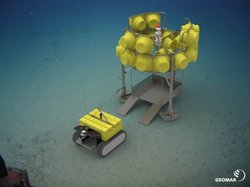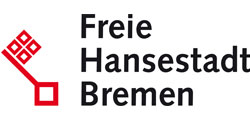ROBEX
Robotic Exploration of Extreme Environments
The Helmholtz-Alliance ROBEX deals with the research of methods for the development of robotic systems in extreme Environments. The application domains moon and deep-sea are examined, joined and common technologies identified and developed. ROBEX joins the major Helmholtz research centers in Germany with the leading university groups in the field of robotics in extreme environments to generate new and innovative technologies for robotic exploration.
| Duration: | 01.10.2012 till 30.09.2017 |
| Donee: | German Research Center for Artificial Intelligence GmbH |
| Sponsor: | State of Bremen |
| Partner: | Alfred-Wegener-Institut für Polar- und Meeresforschung (AWI), Deutsches Zentrum für Luft- und Raumfahrt (DLR), Helmholtz-Zentrum für Ozeanforschung Kiel (GEOMAR), Jacobs Universität Bremen, Technische Universität München, Technische Universität Dresden, Technische Universität Kaiserslautern, Universität Bremen, Technische Universität Berlin, MARUM |
| Application Field: | Underwater Robotics |
| Related Projects: |
EurEx
Europa-Explorer
(12.2012-
04.2016)
CSurvey
A semi-autonomous inspection unit for underwater structures and ship hulls - subproject of CView compound-project
(05.2009-
04.2012)
CUSLAM
Localization and mapping in confined underwater environments
(09.2009-
07.2012)
SeeGrip
Autonomous underwater gripper with tactile feedback for form- and force closed object manipulation.
(09.2009-
03.2013)
|
| Related Robots: |
DAGON
Schilling Orion 7P
|
Project details
Aim of the Helmholtz Alliance “Robotic Exploration of Extreme Environments” ROBEX is to explore synergies between two up to now unrelated research fields that deal with similarly extreme environments: the deep sea and the Moon. We will create an overarching Alliance for identification and development of joint technologies and expect that the combination of these two complementing technological and scientific expertise will lead to substantial advancements in both research fields. Main tasks are:
- Development of specific instrumentation for exploration of extreme, inaccessible environments on Earth (deep sea) and on the Moon with a focus on mobile instrumentation (central docking stations, intelligent instrument control, advancements in power supply and communication systems, development of sensors and robotics).
- Creation of a modular robotic infrastructure environment, both in hardware (set up of advanced demonstrators for lunar/deep sea application, networking of system components, mobility, manipulability, autonomy etc.) and in software (modular approach in order to cope with re-configurability needs).
- Field tests for available and newly developed instrumentation in the deep sea and on land (lunar analogies) to test feasibility and operability in the respective environments. The field tests will be applied towards specific research fields in the deep sea (e.g. gas hydrates, hydrothermal vents, slope stability) and lunar science fields (thermo-chemical evolution of Moon, lunar rock types, size of crust and core size of Moon, analysis of volatiles and ice on the lunar surface and at the lunar South Pole).
In the context of the ROBEX project, the DFKI RIC develops – amongst other things – intelligent algorithms for the autonomous navigation of tracked underwater vehicles in unknown territory. For this purpose, methods from space robotics and terrestrial robotics are adapted to the conditions of underwater vehicles and are further developed in order to be able to autonomously explore an area relevant for Marine Research as part of a deep sea demo mission.
More details about this project are available on the ROBEX project website:
http://www.robex-allianz.de/




